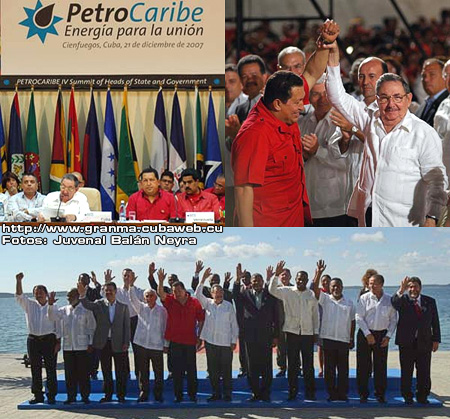Petroleum policy of Venezuela and PETROCARIBE
December 24, 2007

11 presidents, prime ministers and representatives of 17 countries – members of the organisation, for whom overcoming the threat of energy crisis is a vital task of economic survival, preserving social tranquility and real sovereignty.
That is why, the most «mistrustful» countries of the region join in PETROCARIBE. The last example is Honduras, which, in the sphere of oil supplies, completely depended on the «mercy» of US companies. Preferential oil supplies from Venezuela, deferment of payment for the supplied carbohydrates, consent for replacement of parts of these payments by goods, services or food, - all this seems to be incredible against the background of dominating capitalist «rules of the game» and neo-liberal theories, «disproving» socialist formulas of the economics.
However, strategic programs of H. Chavez on the use of oil resources to speed up the integration of countries of Latin America and the Caribbean are not restricted by this. As Chavez stated, by 2017 Venezuela will have taken the steps to construct 10 new petroleum refineries on its territory and 8 in the region. The first such plant is already under construction in Nicaragua (its approximate cost is 4.5 billion dollars).
There is no doubt that implementing its program «Siembra del Petroleo» (Sow the Petroleum), Venezuela will be guided by friendly, ideologically close regimes. «Restoration from the ashes» of refinery complex in the Cuban city of Cienfuegos was the demonstration of such an approach. The Soviet Union started to built that plant in the 80s, but in the epoch of Russia the construction was abandoned by virtue of various reasons, including, «political incompatibility» of wild capitalism in Russia and unshakeable socialism of Fidel Castro.
The complex in Cienfuegos, «jointly» controlled by Cuba and Venezuela, will initially process 66 thousand barrels of Venezuelan oil a year. Acting president of Cuba Raul Castro and Hugo Chavez took part in inauguration of the refinery. Belize, Nicaragua and Honduras are known to be the first foreign users of the complex production.
At the 4th Summit H. Chavez underlined that the previous, «dependent» petroleum policy of bourgeois governments of Venezuela that put under the actual control of the United States the energy industries of the country, became things of the past.